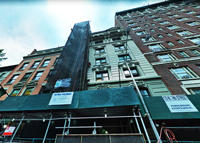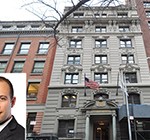Greystone’s bid to dismiss a fraud claim was rejected last week in its latest troubles over a condo-conversion project at 164 West 74th Street.
A group of real estate investors alleged in a January 2021 complaint filed with the New York County Supreme Court that Greystone duped them into contributing millions of dollars based on an artificially deflated budget and project timeline.
In 2015, real estate development and investment firm Prime Rok picked up 164 West 74th Street, a 30,000-square-foot property built in 1920 on a tree-lined block on the Upper West Side’s 74th Street with access to the subway, retail, restaurants and Central Park.
Prime Rok met with Jeffrey Simpson and Jared Chassen, who were at the time Greystone’s chief executive officer and head of acquisitions, respectively. The two made what the complaint dubs an “aggressive pitch” to partner with Prime Rok.
Greystone estimated the project would take no longer than 12 to 18 months to complete and would cost between $49.7 and $50 million. The figures included acquisition, development and financing costs. Greystone also projected profits of at least $1.4 million to Prime Rok upon project completion.
The budget was “a total sham,” the complaint alleged, used “to dupe lenders.”
Read more



As development continued on the project, the complaint alleged Greystone ignored or provided vague responses to Prime Rok’s requests for updates.
By October 2018, after Greystone’s initial estimate indicated the project should have been completed, Prime Rok requested more transparency. Greystone in turn revealed its actual budget, which indicated that in comparison with the initial budget, soft costs were 98 percent higher, financing costs were 73 percent higher and hard costs were 44 percent higher, according to the complaint. In total, there were $12 million more in project costs.
Later Greystone requested at least another $8 million, swelling the project’s costs to over $68.5 million — $20 million over the original budget.
Greystone then told Prime Rok that Simpson and Chassen were no longer at the company.
“Little did Prime Rok know … Simpson and Chassen had not planned to
stay at Greystone for long, and thus were willing to say whatever it took to draw in Prime Rok’s
business,” the investor alleged in the complaint.
The investor said it also learned Greystone opted against available low-interest funds from conventional lenders to raise additional capital for the project. The developer instead brokered a preferred equity deal with Black Bear Asset Management in 2016, needlessly increasing costs of capital by at least $3.5 million. Under its deal with Black Bear, Greystone obtained $9.45 million in project funding at an interest rate of 14 percent per year, when it could
have obtained a loan in the same amount at 6 percent interest or less.
In a June 2020 update, Greystone indicated the budget increased from $62 million to over $68.5 million. In total, there was a 40 percent increase over the original project budget.
“We are pleased with the Court’s decision and look forward to pursuing our clients’ claims on the merits,” the investors’ attorneys, Terrence Oved, Andrew Urgenson and Christopher Rados of Oved & Oved, said in a statement.
Prime Rok is seeking damages in an amount determined at trial. Greystone did not immediately respond to requests for comment.
